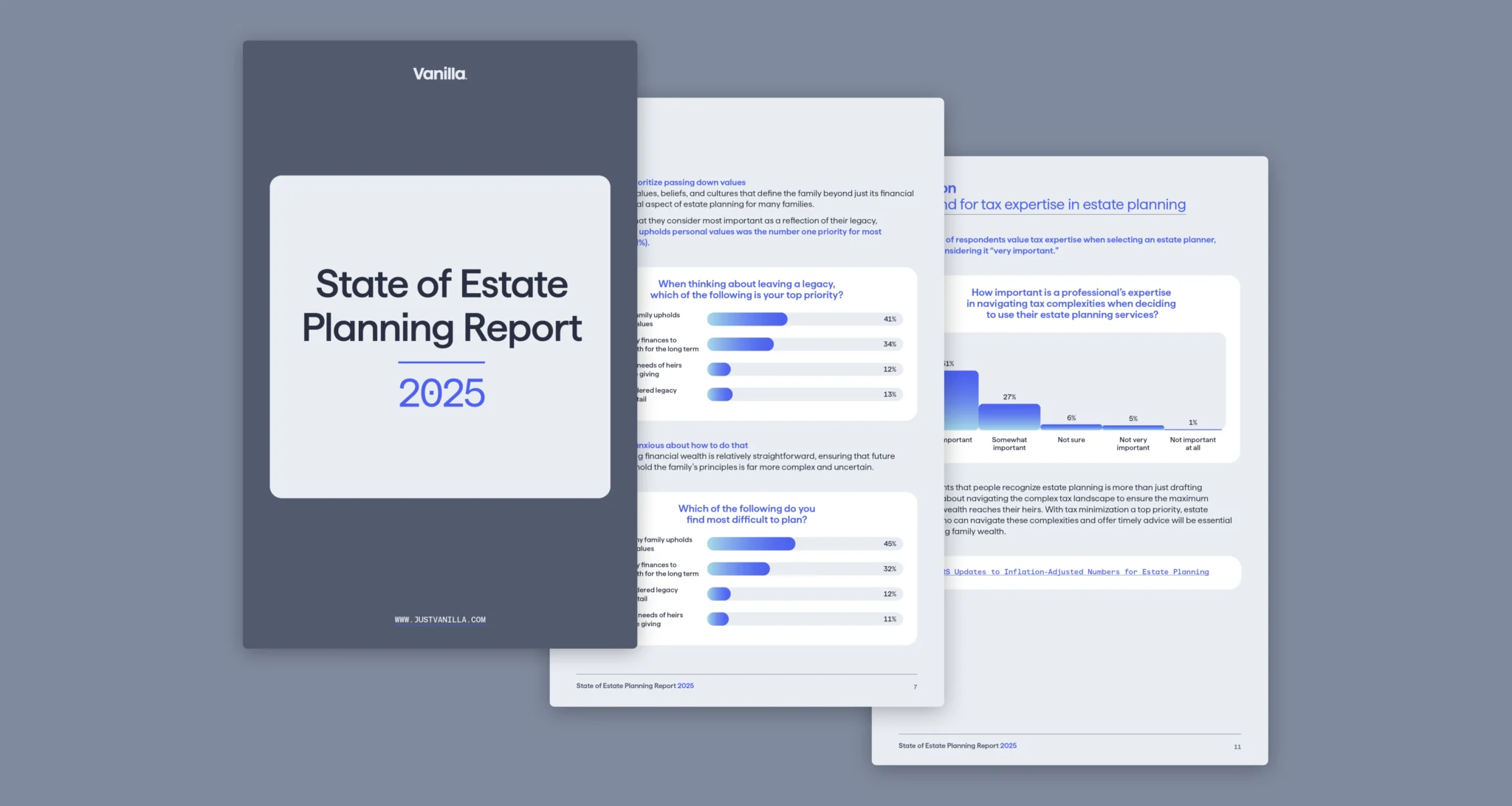Category: Estate Planning


Vanilla
•
Apr 04, 2025
What You Need to Know about Generation-Skipping Gifts (and Their Tax Implications)
Gifting to your children is an excellent way to reduce estate tax liabilities, but sometimes it makes more sense to give directly to grandchildren, rather than to your children. Because these gifts “skip” a generation, they are referred to as generation-skipping transfers (GST) and have special tax treatment. There are a few important things to keep in mind when considering a generation-skipping transfer gift, including the generation-skipping transfer tax. We’ll break the tax down for you and give you a few more important pointers to pay attention to. What is the generation-skipping transfer tax? The generation-skipping transfer tax (or “GSTT”)...


Vanilla
•
Mar 04, 2025
10 Diagrams to Explain Advanced Estate Planning Strategies
Tax planning for clients with taxable estates has always been complex. We’ve learned the best way to explain estate planning strategies is with diagrams, not documents. That’s why we’ve put together this deck of 10 diagrams to explain some of the advanced strategies and why household with $10M in assets should care about estate tax. Why $10M in household assets? In 2026 the Estate Tax exemption drops down to just about $10M (or higher based on inflation). The 10 diagrams explain both why you need advanced strategies and how 8 different strategies work. We’ve explained them all below but if...


Madison Eubanks
•
Feb 21, 2025
Why You Need to Periodically Update Your Estate Plan (and the Risks of...
Going to the dentist, getting an oil change, getting a flu shot, cleaning out the gutters, taking your pet to its annual vet appointment—these aren’t things that most people look forward to doing, but they’re all regular maintenance tasks that we do throughout the year. And while no one wants to add yet another item to life’s list of chores, estate planning updates deserve a place on the docket. This doesn’t need to be done every year, but ongoing maintenance is crucial for an optimized plan. In this article, we’ll discuss why updating an estate plan is important, how often...


Madison Eubanks
•
Feb 21, 2025
What Happens if You Die Without a Will? Understanding Intestacy Laws
Intestacy, or dying intestate, is legalese for when a person passes away without a will. When a person dies “intestate,” their estate is subject to the intestacy laws of the state they lived in. This means that who inherits the estate is left up to the government as defined by the state’s intestacy laws, rather than by the deceased person’s choice. This can give rise to any number of issues and can create headaches for the intestate person’s family and loved ones. The purposes of wills and trusts are, of course, to communicate one’s wishes for what should happen to...


Vanilla
•
Feb 06, 2025
What is a spousal lifetime access trust (SLAT), and how does it work?
What is a spousal lifetime access trust (SLAT)? A Spousal Lifetime Access Trust (“SLAT”) is an irrevocable trust set up by an individual (the “donor”) during his or her lifetime for the benefit of the individual’s spouse and if, desired, other family members. How does the SLAT work? A SLAT is created under a trust agreement, which contains the terms of the trust and the name of the individuals or entity that will act as trustee (typically a trusted friend or advisor). A SLAT is funded by way of a gift from the donor to the SLAT. During the...


Vanilla
•
Feb 04, 2025
The 4 Core Estate Documents: What they are and why they’re essential for...
According to a 2024 survey from Caring.com, 40% of Americans don’t think they have enough assets to create a will. This reveals a general lack of understanding around the purpose of a will, which does more than handle financial assets. There’s an enormous opportunity for advisors to help educate clients about the goals of estate planning and core estate documents. If you have a handle on the core estate documents and how they benefit your clients’ finances in the long term, you’ll be more likely to provide advice and guidance that will strengthen ongoing relationships with clients and their families....


Vanilla
•
Jan 23, 2025
Spotlight on Special Needs Trusts: Everything You Need to Know about SNTs
By Lisa A. Cohen, CEO of Visible National Trust Special needs trusts are the cornerstone of disability estate planning, and disability affects many more people and families than we might expect. Incorporating special needs trusts into estate planning brings certainty that families’ wishes will be implemented for their loved ones. Visible National Trust serves families and individuals across the country with complete turnkey special needs trust solutions that meet families’ high service standards and evolving needs. Seventy (70) million Americans live with a disability, according to the CDC. Twenty-three (23) million people with disabilities require lifetime support, affecting seventeen percent...


Madison Eubanks
•
Dec 10, 2024
18 Stats to Know from Vanilla’s 2025 State of Estate Planning Report
In case you missed it, our recently released Vanilla’s 2025 State of Estate Planning Report is chock full of relevant facts and figures about what’s new and noteworthy in consumer mindsets around planning. This annual survey of 1,000 US consumers is designed to unlock insights about how people view their families and values as well as the role of advisors and technology in the context of estate planning. While the full report is well-worth a read, we also put together this skimmable roundup of some of the most important (and sometimes surprising) findings. Read the complete, ungated State of Estate...


Vanilla
•
Dec 05, 2024
3 All New CE Courses Now Available in Vanilla Academy
The best advisors (and, truthfully, our favorite people) are the curious ones—they dig in, ask questions, and are always learning. They want to bring clients great advice that’s backed by education, experience, and perspective. For all the lifelong learners out there, Vanilla is your partner for refreshing, broadening, honing, brushing up, mastering, reviewing, or just dipping your toes into estate planning topics and skills. Vanilla Academy launched earlier this year as an estate planning learning hub for advisors who want to up-level their offering and show clients a breadth of expertise, and we’ve just added three additional courses to the...











